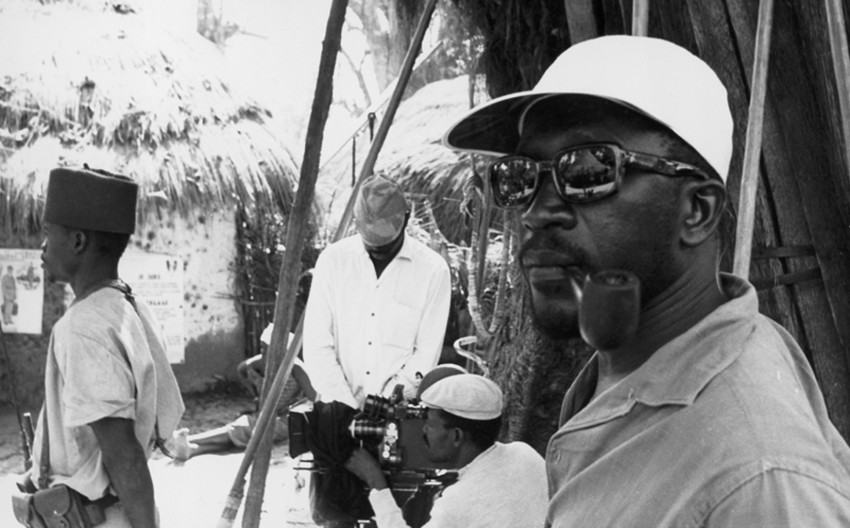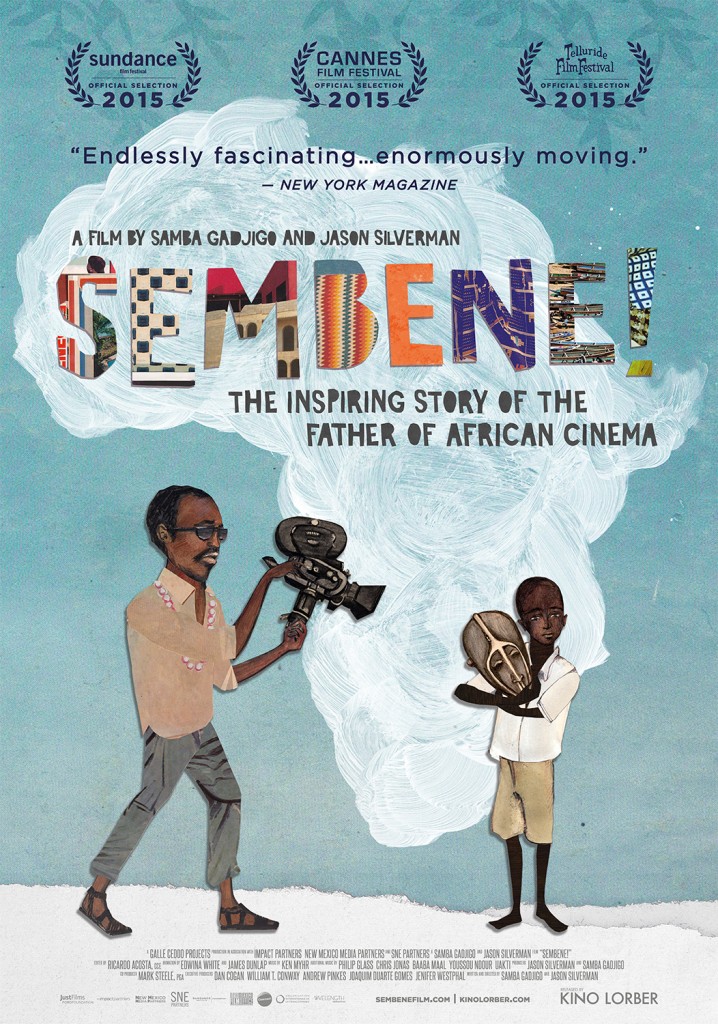
“Black people need a Black film. We need our own heroes.”
Those words echo from the outspoken mind of Ousmane Sembene, a fifth-grade dropout and dockworker from Senegal, who in 1952 began his lifelong journey to tell the story of Africa for Africans – for the first time through their own mirror. While he began that journey as a self-thought novelist, it would be his films that impacted not only Africa, putting sub-Saharan cinema on the world stage, but the world, as he created social and politically laced stories and images that transformed memory and inspired generations to come.
SEMBENE! is the new documentary told and directed through the experiences of the auteur’s friend, colleague and biographer Samba Gadjigo. Using rare archival footage, more than 100 hours of exclusive materials, and wonderfully animated chapter screens (as reflected in the poster), the film is co-directed by award-winning filmmaker Jason Silverman (Olympia, Shameless). Though they were close, Gadjigo’s close relationship with Sembene does not dilute the story, but projects the power of Sembene and his artistry alongside his often contemptible and contradictory nature.
To put it lightly but saliently, Ousmane Sembene was a trip.
After becoming near paralyzed working the docks in Marseilles, France, during the early 1950’s, he is hospitalized for months and becomes a voracious reader. This leads him to craft his own important stories about his people, “writing to be a voice for the voiceless.” Celebrity from those novels (the most famous of which is Les Bouts de Bois de Dieu (Gods Bits of Wood)) led Sembene to be invited by the then Soviet Union’s Gorky Film Studio to study filmmaking. The power of this visual medium allowed Sembene to grasp that cinema was the best way for his fellow Senegalese and Africans, amidst a time of West African independence and renewed pride, to grasp their stories outside of just the griot-based oral standpoint, to create new visions of Africa. This was especially necessary since up to 85% of the populace at the time was illiterate.

And this is the beginning of everything. With his potent blend of documentary, French New Wave, and Realism film styles, coupled with his African sensibilities, from first hit film La noire de… (Black Girl – 1966), through the political satire Xala (1975), the religion-filled indictment Ceddo (1977), and his final controversial film Moolaadé (2004) – though frankly, all eleven of his films were controversial at one level or another – Sembene would become and remain the voice of his people, whether they wanted him to or not.
As the audience’s guide to and through SEMBENE!, Gadjigo’s own life growing up in a small village in Senegal open the documentary. Growing up in that Francophone country, he was taught to want to be French, but upon nearing college age and discovering Sembene’s work, he “did not want to be French anymore. I wanted to be African.” As Gadjigo works to become an academic, he also aims to spread the vision of Sembene’s African stories to the world at large, inviting his hero to America – but quickly learns how disappointing it can be to first meet your heroes as the stubborn Sembene disregards Gadjigo’s outreach.
And it is those conflicting natures of Sembene that Gadjigo and Silverman make shine throughout the film. As much a showman as he is a recluse, an outsider as he is a man of the people, Sembene was very conflicted. The archival news and documentary interviews deftly show his passion for African stories and liberation, yet he could barely connect with his own children. As his son Alain sadly recounts, “He did not like to talk about family, in the general sense…Family, I think was painful…I think it’s something he could never manage in his life. Never…”

This is because he did whatever he had to, would sacrifice the unthinkable, to get his films made. From the marriage to his muse Carrie Moore, to their eventual divorce, and even an unthinkable betrayal of his young protégé, Sembene was devoted to his art, his genius constantly giving way to a kind of madness.
“I’m not unpleasant. It’s the way I was born,” says Sembene in an archival interview toward the end of the film. Yet the undying devotion that Africans, and African filmmakers, have to the director well past his 2007 death is unbreakable. In my chat with Gadjigo, he shared that, regarding Sembene’s influence on modern African filmmakers, “Whether they want to emulate or go around him, he’s always there.” And after viewing this film of the man who defined and re-defined Africa, Sembene will always be with you too.
After playing worldwide all year, including at the Cannes Film Festival (of which Sembene served on the Jury) and the Sundance Film Festival, the film makes it theatrical premiere on Friday, November 6th at the Lincoln Plaza Cinema in New York City and play until November 12th.
2015 Theatrical dates
Dartmouth College – Hanover, NH (November 8th)
the Virginia Film Festival – Charlottesville, PA(November 8th)
Sembene Film & Arts Festival – Pittsburgh, PA (November 12)
Angelika Pop-Up at Union Station – Washington D.C. (November 20-26)
Laemmle Playhouse 7 – Pasadena, CA (November 23 to December 3rd)
Related Links
Official Film Website – http://www.sembenefilm.com/


